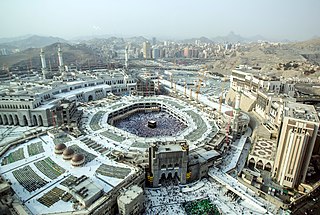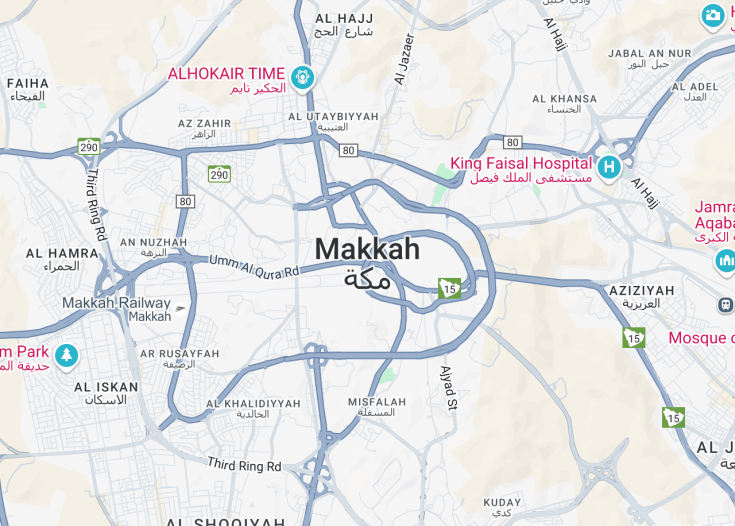Mecca, located in Saudi Arabia, is a city steeped in deep cultural and religious significance. As the birthplace of Prophet Muhammad and the site of the Kaaba, it is considered the holiest city in Islam. Every year, millions of Muslims from around the world undertake the pilgrimage to Mecca, known as Hajj, as a mandatory religious duty if they are physically and financially able. The city is also renowned for its ritually structured areas, which non-Muslims are prohibited from entering, preserving its sanctity. The blending of profound devotion and intricate rituals creates a unique spiritual atmosphere unlike anywhere else in the world.
Plan your trip to coincide with the period outside of Hajj for a more contemplative experience, as the city is significantly less crowded and more accessible.
Carry essential items like water, sunblock, and comfortable footwear, as navigating Mecca during your visit can involve extensive walking under the sun.
Top things to do & see in Mecca
Select the following sights and activities to discover best tickets and tours available in Mecca.
Mecca: The Spiritual Heart of Islam
| Country | Saudi Arabia |
| Time in Mecca | GMT+3 |
| Language spoken | Arabic |
| Population | 1,675,368 (United Nations data, 2021) |
| Currency | Saudi Riyal (SAR ﷼) |
| Airports |
|
Mecca, located in Saudi Arabia, is unarguably one of the most significant spiritual centers in the world for Muslims. Every year, millions of pilgrims visit this holy city, which is the birthplace of the Prophet Muhammad and the site where the Quran is said to have been revealed. The city is home to the Masjid al-Haram, the largest mosque in the world, which includes the sacred Kaaba, towards which Muslims around the globe pray.
This city is not only a spiritual hub but also a place rich in history and culture. Despite being closed to non-Muslims, Mecca’s significance and its impact on the global Islamic community cannot be overstated. The annual Hajj pilgrimage, a mandatory religious duty for Muslims that must be carried out at least once in their lifetime by all adults who are physically and financially capable, solidifies Mecca’s place as a focal point of religious activities in the Islamic world.
Beyond its religious prominence, Mecca is a city that has grown significantly in infrastructure to accommodate the vast influx of pilgrims throughout the year. The city boasts advanced facilities and robust structures to manage the annual pilgrimage’s logistical demands. It is a place where tradition and modernity uniquely intertwine, visible in the cityscape surrounding the sacred mosque.
Historically, Mecca’s role has been instrumental from the time of Prophet Abraham through to the rise of Islam, serving as a center of trade in the Arabian Peninsula. Its historical routes and the continued reverence seen in Islamic traditions today echo through the daily lives of its residents.
Where is Mecca?
Mecca is nestled in a desert valley in western Saudi Arabiaand is the capital of the Mecca Province.
Distances:
| Route | Distance by car | Time by car |
|---|---|---|
| Riyadh to Mecca | 560 mi (901 km) | approx. 8-9 hrs |
| Jeddah to Mecca | 45 mi (72 km) | approx. 1 hr |
| Medina to Mecca | 248 mi (399 km) | approx. 4 hrs |
What is Mecca famous for?
Mecca is famous as the holiest city in Islam, housing the Kaaba, the direction towards which all Muslims pray. It is the birthplace of Prophet Muhammad and the center of the Islamic world.
History
Pre-Islamic Era (Before 610 AD)
The city of Mecca’s origins are steeped in mystery, but it is known to have been a significant settlement as early as the 4th century AD. It became a central hub for trade across the Arabian Peninsula, connecting major trade routes. The region was primarily pagan, with a polytheistic belief system and the Kaaba, a cube-shaped building in the heart of the city, served as a sanctuary housing statues of various deities.
Rise of Islam (610 AD – 632 AD)
In 610 AD, the Prophet Muhammad received revelations from Allah, marking the beginning of the Islamic faith. Mecca initially resisted Muhammad’s teachings, leading to his migration to Medina in 622 AD, an event known as the Hijra. The city continued to be a place of contention until 630 AD when Muhammad returned with an army, peacefully took control, and established Islam as the city’s religion. The pagan idols within the Kaaba were destroyed, transforming it into the holiest site in Islam.
Islamic Golden Age (8th Century – 13th Century)
During the Islamic Golden Age, Mecca continued to flourish as the spiritual center of Islam. The city saw significant developments in infrastructure and architecture, and the annual pilgrimage, or Hajj, attracted Muslims from across the Islamic world. This period was marked by the growth of scholarly and cultural activities, which further enhanced Mecca’s position in the Islamic world.
Ottoman Rule (16th Century – 20th Century)
Subjugated by the Ottomans in the 16th century, Mecca came under the rule of various governors appointed by the Ottoman sultans. The Ottomans left a significant mark on the city’s architecture and infrastructure, introducing complex water systems and restoring and expanding the Masjid al-Haram to accommodate the increasing number of pilgrims. The city’s status as a religious center was bolstered during this period, though it also saw periods of political and economic instability.
Modern Era (20th Century – Present)
The modern era of Mecca began with its integration into the Kingdom of Saudi Arabia in 1925. Under Saudi rule, the city has witnessed unprecedented development, especially in terms of pilgrim facilities and urban infrastructure. The Saudi government has implemented numerous projects to expand and modernize the Grand Mosque and its surrounding areas to accommodate the ever-growing number of pilgrims each year. Despite these changes, Mecca has retained its crucial spiritual significance for Muslims worldwide.
Visit Mecca
What to see and do in Mecca
Mecca is primarily known for its religious significance. The focal point of any visit is the Masjid al-Haram, the largest mosque in the world, which houses the Kaaba. Pilgrims perform the Hajj and Umrah rituals here, circling the Kaaba in a practice known as Tawaf. Nearby, the well of Zamzam located within the mosque is another significant site, believed to have miraculous origins. Visitors can also explore the surrounding mountains which have historical significance—Mount Arafat, where the Prophet Muhammad gave his Farewell Sermon, and the Cave of Hira, where he received his first revelation.
- Masjid al-Haram and the Kaaba
- Zamzam Well
- Mount Arafat
- Cave of Hira
Festivals and Events in Mecca
The most significant event in Mecca is the annual Hajj pilgrimage, occurring in the last month of the Islamic lunar calendar, Dhul-Hijjah. This spiritual gathering draws millions of Muslims, fulfilling one of the five pillars of Islam. Following the Hajj, the Festival of Sacrifice, or Eid al-Adha, takes place, commemorating the willingness of Ibrahim to sacrifice his son in obedience to God’s command.
Best time to visit Mecca
The best time to visit Mecca is during the cooler months from November to February. Weather conditions are more favorable for performing outdoor rituals, particularly for pilgrims engaged in the Hajj or Umrah. Nonetheless, given the city’s religious importance, Mecca experiences a constant influx of visitors year-round.
Is Mecca worth visiting?
Mecca holds immeasurable religious importance for Muslims and visiting it for the Hajj or Umrah can be a profoundly spiritual experience. The city offers unique historical and cultural insights into Islamic traditions. However, Mecca’s pilgrimage-centric nature means non-Muslim visitors are not permitted in the holy areas, and the city can be extraordinarily crowded during Hajj season. For Muslims around the world, it is unquestionably worth visiting, but others might find limited access and the climatic conditions challenging.










